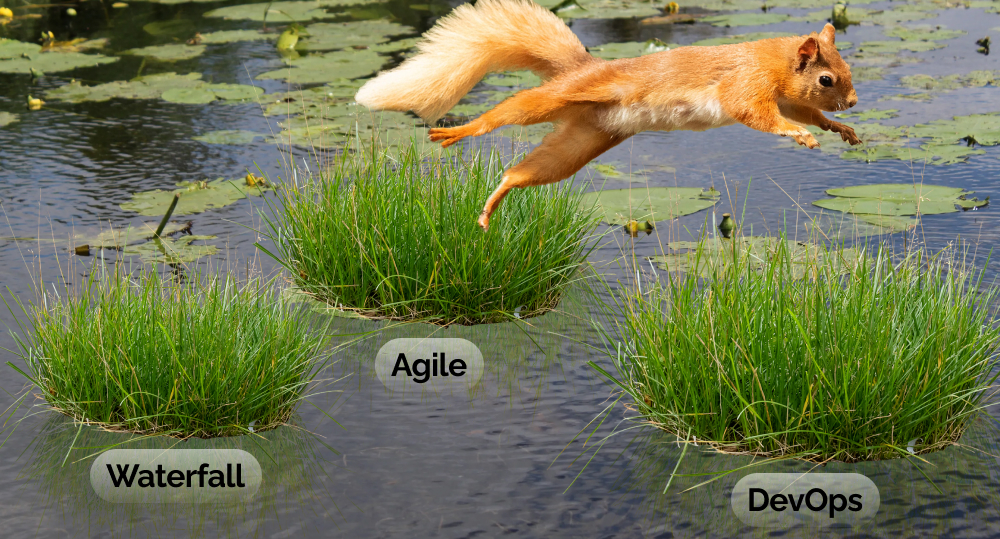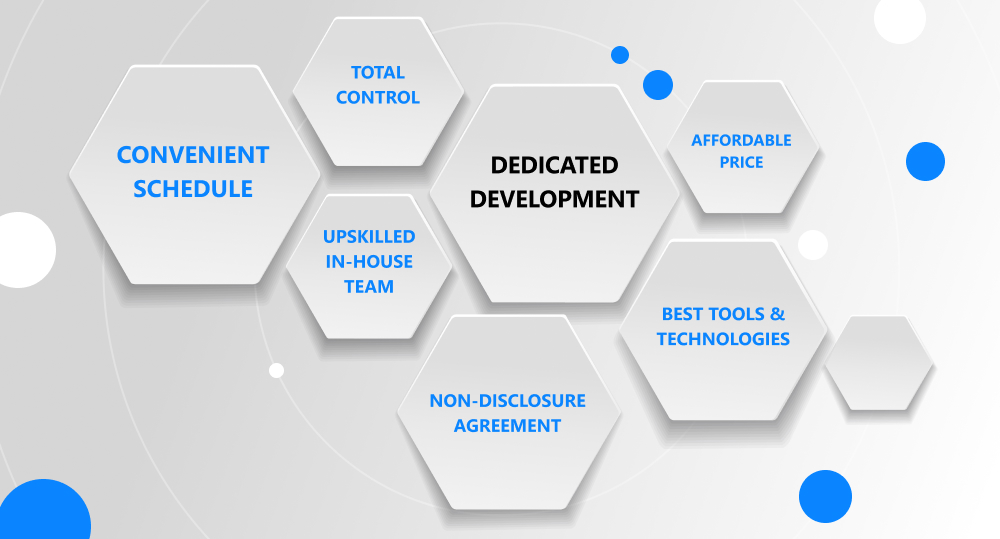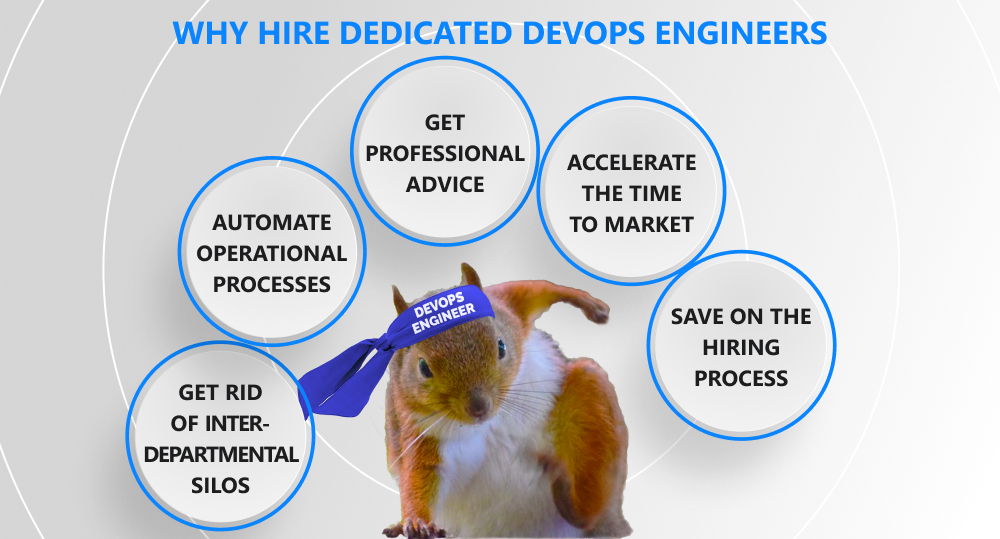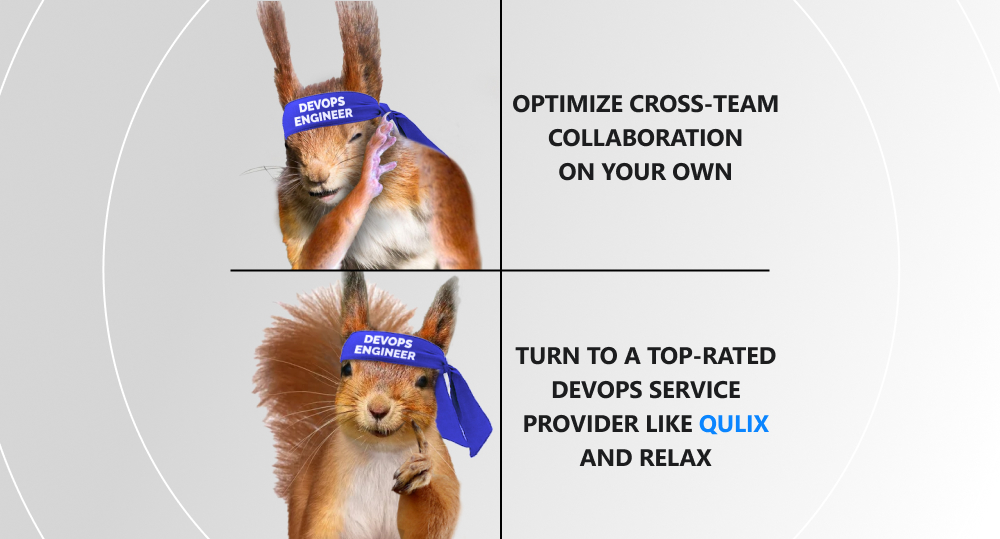Still looking for a sign to hire a dedicated DevOps developer? Stop wasting your time, buddy, and listen to our advice. Since DevOps engineers are well-versed professionals capable to bridge the gaps between siloed teams, their services are pricey. That is why, when making such decisions, trust IT consultants and reliable information sources (like this article), not signs.
Here, we share our time-tested guide to DevOps and dedicated development, as well as explain when it's time to hire DevOps engineers and why. Read on!
written by:
Alexander Bas
Senior DevOps Engineer
Still looking for a sign to hire a dedicated DevOps developer? Stop wasting your time, buddy, and listen to our advice. Since DevOps engineers are well-versed professionals capable to bridge the gaps between siloed teams, their services are pricey. That is why, when making such decisions, trust IT consultants and reliable information sources (like this article), not signs.
Contents
7 Answers to FAQs About DevOps
Let's start with the basics and explore DevOps development services in a plain and simple FAQ manner.
#1. What Is the Concept of DevOps?
DevOps (a portmanteau word from “development” and “operations”) is a relatively new yet well-established approach to software creation that unites development and operations teams to eliminate silos and streamline workflow.
But how did we get there? Well, about 30 years ago, when working on large-scale projects, development teams employed the waterfall methodology that presupposed a linear approach, i.e., engineers proceeded to the next stage only after finishing the previous one. This approach turned out to be rather ineffective, since the developers had to spend several months or even years to roll out the next software version.
As a result, the agile methodology came into the world. Its iterative nature and flexibility allowed developers to update source code more frequently and, therefore, constantly enhance their products. How does it work? Well, instead of pooling their efforts around the entire code base, IT specialists split it into small parts, test them, fix the bugs, and automatically integrate the updated pieces of code into the base. Continuous integration and delivery (CI/CD) are the key practices of this methodology.
Although Agile propelled the software development life cycle to the next level, some issues have been left unresolved. For instance, the development team and IT operations team (responsible for configuration management, system monitoring, and acceptance testing) still worked separately, one after another, which slowed down the software delivery process. And that's why the game-changing DevOps model was invented.
By fostering cross-team collaboration under the close eye of experienced DevOps engineers and implementing continuous delivery and infrastructure automation, the DevOps approach unlocks vast opportunities for product enhancement and cost optimization. And the fact that 61% of companies that switched to DevOps already enjoy such benefits only proves the efficiency of this methodology.
#2. What Are the Types in DevOps?
DevOps adoption is not only about stable operating environments and the change in the development process, but also about a special mindset that encompasses instant communication, close collaboration, and responsibility equally shared among all team members.
At the same time, depending on the desired outcome, the DevOps culture may be divided into the following (these are just several out of many) types:
- Traditional DevOps that involves CloudOps (software development optimization in cloud-native architecture environments) and SysOps (creation of highly scalable systems in compliance with business needs);
- DevSecOps (patching vulnerabilities and conducting security audits throughout the entire SDLC);
- DataOps (ongoing work on database clusters for enhanced analytics);
- MLOps (streamlining the machine learning lifecycle in production environments).
#3. What Are the DevOps Services?
DevOps is an extensive methodology that unites software development and deployment. Among the major DevOps services, you may find software assessment, process automation, security integration, continuous testing, and CI/CD pipeline implementation.
#4. What Are the 4 Key Components of DevOps?
Four major components that push DevOps practices toward a promising future are the CI/CD framework (automated build and testing), source control management (ongoing version control), Infrastructure-as-a-Code (the ability to reproduce the environment of any circuit at any time), and product stability (i.e., created once, an app can always be created again in similar environments).
#5. What Are the 5 Pillars of DevOps?
Not only does DevOps bring the best of both worlds, but also it CALMS the nerves of project owners. Such an outcome is possible thanks to the core principles of this methodology.
- Culture (everyone is focused on a common goal and helps each other);
- Automation (all the processes that can be automated are automated);
- Lean (the code is split into small parts to increase efficiency);
- Measurement (continuous monitoring and timely threat & error detection)
- Sharing (mutual support and responsibility sharing).
#6. What Companies Have Employed DevOps?
Since the DevOps approach allows businesses to create highly scalable systems that drive user satisfaction, it has already spread all over the globe and won the hearts and minds of various companies. Among the loyal supporters of this methodology, you may find Adobe, HP, Netflix, Amazon, Walmart, and the list goes on.
#7. Should You Have a Dedicated DevOps Team?
Although DevOps development is in hot demand, do not blindly follow the trend. First of all, define project requirements and the scope of your business.
If you run a small startup at the dawn of its growth, most likely, you can do without a fully-fledged DevOps team. Instead, just take advantage of hourly-based consulting services provided by a single dedicated DevOps engineer.
On the contrary, companies in the middle of their business journey that work on several projects and manage several teams/servers/infrastructures may significantly benefit from the assistance of a dedicated DevOps team.
Large IT giants with well-established development processes may find it more lucrative and convenient to hire their own DevOps engineers.
Anyway, since the price tag of such specialists is pretty high, reaching $130,000/year, don't hesitate to make use of DevOps consulting services before making the final decision.
Perfect DevOps Engineers: What Are They?
Now that we've answered the DevOps FAQs, let's roll up our sleeves and create a picture of a brilliant DevOps engineer.
DevOps developers are well-rounded specialists with in-depth knowledge of various tools and technologies and years of practical experience up their sleeves. No wonder, the unemployment rate of such experts hardly reaches 2%.
At the same time, since the scope of their responsibilities is pretty extensive, very often a project requires the involvement of several DevOps engineers with a different tech stack and tools.
Below, we highlight the core skills and qualities to look for when hiring DevOps developers.
Soft Skills
Intricate software products require seamless teamwork. Given that the development process involves close collaboration with various teams and specialists, effective communication and workflow management skills, as well as the ability to translate complex business ideas or technical details is a drawcard of top-notch DevOps engineers.
Popular DevOps Tools and Practices
Apart from interpersonal skills, a top-level DevOps specialist should have proficient knowledge of relevant tools and practices, as well as all the technical qualifications. To get a clear picture of a brilliant DevOps engineer, take a look at the table.
Scope of Application
DevOps Practices & Tools
Project management
Jira, Zendesk, Asana
Source code management (SCM)
Git, Mercurial, Subversion
Database maintenance
MySQL, PostgreSQL, Redis, MongoDB Sharding
CI
Jenkins, CircleCI, GitLab, Docker, ArgoCD, Bamboo
CD
Ansible, Puppet, Terraform, Kubernetes, Openshift
Configuration management (DevOps platforms)
Ansible (Red Hat), Chef, Puppet, Terraform
Cloud computing
AWS, IBM Cloud, GCP, Azure
Monitoring
Prometheus, Grafana, Zabbix, Datadog, Solarwinds
Logging
ELK, EFK, Splunk
A pretty extensive list, huh? But don’t worry, it does not mean your potential candidate should be well-versed in all these technologies, one or two from each category will be more than enough.
Dedicated Development in a Nutshell
Now, that the DevOps concept is crystal clear, let us plunge into the specifics of the dedicated development team model.
Dedicated development (a.k.a. the extended development team model or staff augmentation) is a simple and convenient partnership model that allows proactive entrepreneurs to expand their existing team with knockout specialists for any desired period.
Unlike in the outsourcing model, where the hired developers may simultaneously work on several projects, dedicated teams are 100% involved in your product along with the in-house specialists.
And the good news is that not only do dedicated developers completely merge with the existing team but also bring tangible benefits to your business.
- With a dedicated team on board, you may keep track of all the processes and retain the final word on each matter.
- In case of a significant time difference, dedicated developers will adjust their schedule in compliance with your time preferences.
- If you delegate certain tasks to the dedicated team, this fact will be protected by a non-disclosure agreement (NDA).
- External engineers will get down to your product with their own tools, which means you may get access to the latest technologies for free.
- Your in-house team will get upskilled and enhance their competencies through the work with top-notch mentors.
- On top of that, the dedicated model proves to be budget-friendly, since you leave the drudgery of the hiring process to the service provider and get pre-vetted developers ready for smooth collaboration.
Considering all this, no wonder, more businesses tend to rely on the extended development team model, so that by 2025, the market is likely to reach $81.87 billion.
5 Compelling Reasons to Turn to Dedicated DevOps Developers
If you've read this far, most likely you've realized that extending your team with DevOps developers is what you do need at the moment. If so, let's dive even deeper and clarify when it's time to resort to dedicated DevOps service providers and why.
Reason#1. Software Delivery Slows Down Because of Inter-departmental Silos
As already mentioned, a DevOps engineer is a wizard capable to unite several teams, streamlining their work, and bringing excellent outcomes to the project. Therefore, if you need all the specialists involved in the project to stay on the same page or want to challenge established routines, hire a DevOps developer.
Reason#2. You Want to Automate Certain Processes but Don't Know How
If you feel that some repetitive tasks could be automated or your team hardly copes with the workload, don't hesitate to turn to a DevOps engineer to learn how to overcome such hurdles and eliminate bottlenecks.
Reason#3. You Lack Expertise in the Current Project
When working on a complex project, it's okay to reach a deadlock at a certain stage. Still, to avoid wasting precious development time, it's essential to timely ask for the help of experienced specialists like dedicated DevOps engineers and ensure smooth releases.
Reason#4. You Aim to Boost the Time to Market
The survey by Atlassian indicates that 49% of companies have managed to reduce the time to market thanks to the embedded DevOps practices. Wanna enjoy such an outcome? Just take up their lead.
Reason#5. You Need a Competent DevOps Developer but the Budget Is Tight
As you understand, a DevOps engineer is a well-paid job. And when you hire such a specialist from scratch, conducting a myriad of interviews, the final price tag increases at a dizzy rate. That's why, if you are pressed for budget and value your time, dedicated DevOps specialists may come in handy.
How to Hire the Right Dedicated DevOps Developer?
If any of the above-mentioned reasons do ring a bell to you, dedicated DevOps services may become a perfect solution. Don't know how to hire DevOps developers and not overpay? Just follow our best-of-breed guide!
Step#1. Choose a Reliable Partner
The first and foremost step is to find DevOps engineers with an unmatched level of expertise and relevant tech skills. To simplify the searching process, scrutinize the rating platforms like Clutch.co, CrowdReviews, or GoodFirms. When looking through the list of companies, pay attention to their client reviews and recent cases.
Step#2. Get a Consultation
Once the right tech team is chosen, it's high time to specify the project requirements and define whether DevOps engineers are necessary. At this stage, feel free to make use of the consulting services provided by the IT company of your choice.
Step#3. Select the Business Model
If the consultation has revealed the necessity of DevOps engineers, choose the level of engagement that answers your requirements and capabilities. The most common DevOps hiring models are the following:
Full-Time
Part-Time
Hourly Basis
Time
40 hours per week
20–30 hours per week
Depending on the project
Billing
Monthly
Monthly
Hourly
Minimal Contract Period
1 month
1 month
140 hours
Step#4. Extend Your Team
After you sign the contract (and an NDA, if necessary), the dedicated DevOps team will finally rush to the rescue. When waiting for the specialists, don't forget to think through the onboarding and communication processes and create the conditions for a result-driving environment.
Final Word
Although hiring well-knit DevOps teams may cost a pretty penny, such a step will definitely pay off in the long run, if the specialists are chosen wisely. It means, if the challenge you're facing belongs to the scope of their capabilities and your DevOps partners are trustworthy, you will save formidable resources thanks to automation and timely error fixes.
Wanna skip the searching process and start working with a reliable DevOps service provider? Contact us and get your project meticulously analyzed by top-rated specialists.

Contacts
Feel free to get in touch with us! Use this contact form for an ASAP response.
Call us at +44 781 135 1374
E-mail us at request@qulix.com











